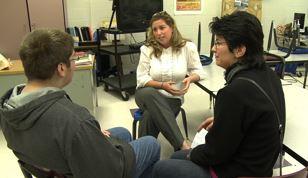Efficacy of RENEW for High School Students with Emotional and Behavioral Challenges

In 2015 the University of Vermont, in collaboration with the Institute on Disability (IOD) at the University of New Hampshire, received a $3.5 million grant from the U.S Department of Education, National Center for Education Research, Institute of Education Sciences, to test RENEW using a multi-site randomized controlled trial. This study will give us better information about what works for transition age youth with emotional and behavioral challenges (EBC). The study is being conducted by a national team that includes researchers from the University of New Hampshire/Institute on Disability (IOD), the University of Vermont, the University of Washington, the University of Oregon, and the University of Massachusetts. Additional study partners include Sheppard Pratt Health Systems in Maryland and the Midwest PBIS Center in Illinois.
The RENEW model, first developed by staff at the IOD at UNH in 1996, is a transition intervention specifically designed to meet the needs of youth with serious emotional and behavioral challenges by providing them with 1) one-on-one youth-driven planning using graphic facilitation, with a focus on empowering each youth to develop his or her career goals, self-advocacy skills, and problem-solving abilities, and, 2) individualized team development that intentionally builds social support networks and leads to enhancement of the youth’s social capital. Staff at UNH have prepared the RENEW model for replication and research, including a manual and set of tools for training and supporting RENEW facilitators, coaches, and supervisors. Four controlled, pre-post intervention studies have shown that youth who receive RENEW experience improved academic and behavioral outcomes in high school and increased employment. The demand for RENEW has grown (it is being implemented statewide through NH’s community mental health system, high schools throughout NH, and in Pennsylvania, Illinois, Wisconsin, North Carolina, Missouri and Maryland), and yet the model has not been tested using rigorous clinical trials.

The RENEW study was funded, in part, because there are very few evidence-based interventions for transition age youth with EBC (What Works Clearinghouse, 2013) and there are no empirically validated interventions anchored in public high schools that address both the educational development and social support needs of youth with EBC. We know that 12-13% of all youth in the United States have serious emotional and behavioral challenges, that 40-60% of youth with EBD drop out of high school each year, and that there are significant costs-over $240 billion per year-of not addressing their needs.
The RENEW study involves approximately 380 ninth and tenth grade high school students from high schools across four states (Illinois, Vermont, New Hampshire, and Maryland) who are considered at risk for school failure because of academic problems and/or being disengaged from school. The study sites are 10 high schools that implement the Positive Behavior Interventions and Supports (PBIS) framework.
The Principal Investigator is Jesse Suter, Research Assistant Professor in the Center on Disability & Community Inclusion (CDCI) at the University of Vermont, and JoAnne Malloy, Clinical Assistant Professor at the Institute on Disability at the University of New Hampshire. The research team also includes Eric Bruns, Associate Professor; Michael Pullman, Research Assistant Professor, University of Washington School of Psychiatry and Behavioral Medicine; Jessica Swain-Bradway at the Midwest PBIS Center; and Mason Haber, Assistant Professor of Psychology at the University of Massachusetts, Worcester.
For more information about the study, please contact JoAnne Malloy at joanne.malloy@unh.edu.
